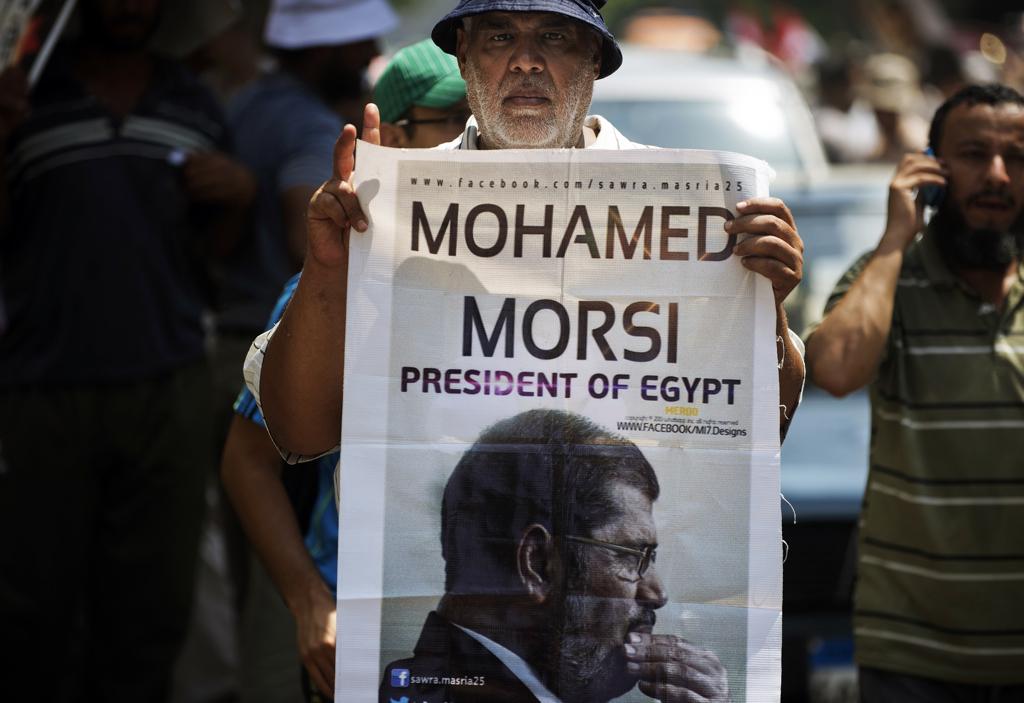Top Brotherhood official tells GlobalPost: Egyptians won’t accept old regime
A man holds a portrait of ousted president Mohamed Morsi as thousands of his supporters demonstrate for his reinstatement close to the Egyptian cabinet headquarters on July 17, 2013 in Cairo.
CAIRO, Egypt — The last week in Egypt has been one of death, horror and chaos.
It kicked off when police and army troops stormed the mass sit-ins staged by the Muslim Brotherhood and supporters of the deposed Islamist President Mohamed Morsi last Wednesday. In their attempts to clear the demonstrations, security forces used excessive lethal force, killing hundreds of Islamist protesters.
The operation set off a spasm of violence across the country, including clashes and deaths in various cities, the burning of churches by Islamists and a military-imposed curfew in 10 of 12 provinces. Between 900 and 1,000 people were killed, according to reports.
At the center of all this is Egypt’s Muslim Brotherhood movement, which rose to power in the wake of the uprising that ousted former President Hosni Mubarak and is now battling for its survival.
Security forces detained Morsi when the military forcibly removed him from office on July 3. Since then, hundreds of Brotherhood leaders and members have been rounded up and sent to prison.
What's next for the world’s oldest political Islamist movement? Will it ever recover to lead Egypt again?
GlobalPost speaks to Morsi’s investment minister and presidential campaign spokesman, Yahia Hamed.
Editors note: answers have been edited for clarity.
The current interim government said Saturday it is considering legal ways to dissolve the Brotherhood. If they do dissolve the movement, what other options does the Brotherhood have to continue to organize and survive as a movement?
The movement survived under the tyrant regime of Hosni Mubarak, and has been in the streets for more than 80 years. They will never able to kill or ban ideas and beliefs in people’s hearts and minds.
Some supporters of Morsi have been seen using weapons or have attacked police stations. Does the Brotherhood accept the use of weapons as a legitimate means to resist the state?
[Defense Minister] Gen. Sisi waged a war against the sit-ins at Rabaa and Nahda, and security forces have returned to invading our homes, with tens of Islamist leaders detained every day without charge. The coup authorities reinstated Mubarak’s emergency law, and yet the media is giving cover to the massacres by claiming that supporters of President Mohamed Morsi have weapons.
We committed ourselves to peaceful protesting, even if this means sacrificing ourselves with our bare chests. We will never admit to the allegations that our supporters possess weapons or that they are adopting a non-peaceful path.
More than 30 churches have been destroyed and countless others — including Christian schools and businesses — attacked. What responsibility does the Brotherhood have to protect these places of worship and ensure their members are not carrying out these attacks? Will some Brotherhood leaders stop publicly blaming Christians for the coup?
We condemn such actions. And we hold the coup government responsible for not securing religious areas, whether it is churches that have been attacked or the several mosques attacked by police themselves. At al-Fateh mosque, they detained more than 300 peaceful protesters, including women, journalists and elders.
There is a very high anti-Brotherhood sentiment in Egypt right now. Why do you think Morsi and the movement became so unpopular? What could the Brotherhood or Morsi have done differently?
In democratic countries, ballot boxes reflect the popular will. On five occasions — the last of which was the approval of the now-suspended constitution through referendum in December —Egyptians determined the path they wanted.
But since day one, the media launched a campaign against everything that Morsi did. Were there mistakes? Of course there were. What did we think would happen after 30 year’s of Mubarak’s dictatorship? He left Egypt with more than $350 billion in national debt and all kinds of internal problems — including education, health, infrastructure, you name it.
But we also saw exports increase and a decrease in our reliance on imports under Morsi. And we signed investment agreements with countries like Brazil, China, Sudan and Turkey.
Do you see the Brotherhood or Islamists in general playing a political role in Egypt’s near or long-term future?
Yes, I do — in the near future. And Egyptians will never accept a return to the old regime, even if this means dying with dignity.
Under what circumstances would the Brotherhood negotiate with the current government? And is there a mediator you would trust to guarantee those negotiations?
Any negotiations should be based on the reversal of the coup and its effects. And in this we were quite open with the European delegation and US envoy.
We want to hear your feedback so we can keep improving our website, theworld.org. Please fill out this quick survey and let us know your thoughts (your answers will be anonymous). Thanks for your time!
